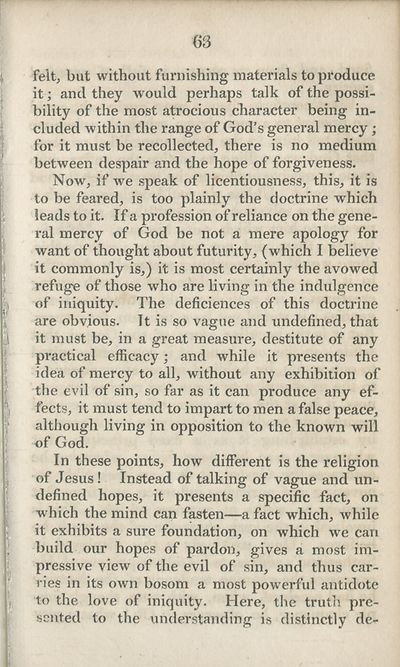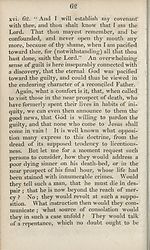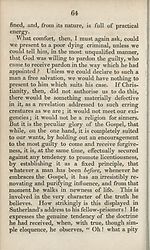Crime & punishment > Notes of conversations with H. M'Donald, N. Sutherland, and H. M'Intosh, (who were executed at Edinburgh, April 22, 1812,) during the time they were under sentence of death
(71)
Download files
Complete book:
Individual page:
Thumbnail gallery: Grid view | List view

63
felt, but without furnishing materials to produce
it; and they would perhaps talk of the possi¬
bility of the most atrocious character being in¬
cluded within the range of God’s general mercy;
for it must be recollected, there is no medium
between despair and the hope of forgiveness.
Now, if we speak of licentiousness, this, it is
to be feared, is too plainly the doctrine which
leads to it. If a profession of reliance on the gene¬
ral mercy of God be not a mere apology for
want of thought about futurity, (which I believe
it commonly is,) it is most certainly the avowed
refuge of those who are living in the indulgence
of iniquity. The deficiences of this doctrine
are obvious. It is so vague and undefined, that
it must be, in a great measure, destitute of any
practical efficacy; and while it presents the
idea of mercy to all, without any exhibition of
the evil of sin, so far as it can produce any ef¬
fects, it must tend to impart to men a false peace,
although living in opposition to the known will
of God.
In these points, how different is the religion
of Jesus! Instead of talking of vague and un¬
defined hopes, it presents a specific fact, on
which the mind can fasten—a fact which, while
it exhibits a sure foundation, on which we can
build our hopes of pardon, gives a most im¬
pressive view of the evil of sin, and thus car¬
ries in its own bosom a most powerful antidote
to the love of iniquity. Here, the truth pre¬
sented to the understanding is distinctly de-
felt, but without furnishing materials to produce
it; and they would perhaps talk of the possi¬
bility of the most atrocious character being in¬
cluded within the range of God’s general mercy;
for it must be recollected, there is no medium
between despair and the hope of forgiveness.
Now, if we speak of licentiousness, this, it is
to be feared, is too plainly the doctrine which
leads to it. If a profession of reliance on the gene¬
ral mercy of God be not a mere apology for
want of thought about futurity, (which I believe
it commonly is,) it is most certainly the avowed
refuge of those who are living in the indulgence
of iniquity. The deficiences of this doctrine
are obvious. It is so vague and undefined, that
it must be, in a great measure, destitute of any
practical efficacy; and while it presents the
idea of mercy to all, without any exhibition of
the evil of sin, so far as it can produce any ef¬
fects, it must tend to impart to men a false peace,
although living in opposition to the known will
of God.
In these points, how different is the religion
of Jesus! Instead of talking of vague and un¬
defined hopes, it presents a specific fact, on
which the mind can fasten—a fact which, while
it exhibits a sure foundation, on which we can
build our hopes of pardon, gives a most im¬
pressive view of the evil of sin, and thus car¬
ries in its own bosom a most powerful antidote
to the love of iniquity. Here, the truth pre¬
sented to the understanding is distinctly de-
Set display mode to:
![]() Universal Viewer |
Universal Viewer | ![]() Mirador |
Large image | Transcription
Mirador |
Large image | Transcription
| Permanent URL | https://digital.nls.uk/125759707 |
|---|
| Description | Thousands of printed books from the Antiquarian Books of Scotland collection which dates from 1641 to the 1980s. The collection consists of 14,800 books which were published in Scotland or have a Scottish connection, e.g. through the author, printer or owner. Subjects covered include sport, education, diseases, adventure, occupations, Jacobites, politics and religion. Among the 29 languages represented are English, Gaelic, Italian, French, Russian and Swedish. |
|---|

